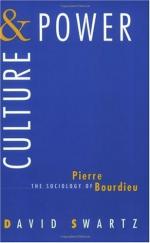|
This section contains 14,641 words (approx. 49 pages at 300 words per page) |

|
SOURCE: Moi, Toril. “Appropriating Bourdieu: Feminist Theory and Pierre Bourdieu's Sociology of Culture.” New Literary History 22, no. 4 (autumn 1991): 1017-49.
In the following essay, Moi analyzes Bourdieu's social theory in the context of feminist critical thinking.
Feminism as Critique
Feminist theory is critical theory; feminist critique is therefore necessarily political. In making this claim I draw on the Marxist concept of “critique,” succinctly summarized by Kate Soper as a theoretical exercise which, by “explaining the source in reality of the cognitive shortcomings of the theory under attack, call[s] for changes in the reality itself” (93). In this sense, Soper writes, feminist critique comes to echo critical theory as developed by the Frankfurt School with its emphasis on “argued justification for concrete, emancipatory practice” (93).1 This is clearly an ambitious aim, which would require me to situate Pierre Bourdieu's social theory in relation to the specific French social formation which produced...
|
This section contains 14,641 words (approx. 49 pages at 300 words per page) |

|


